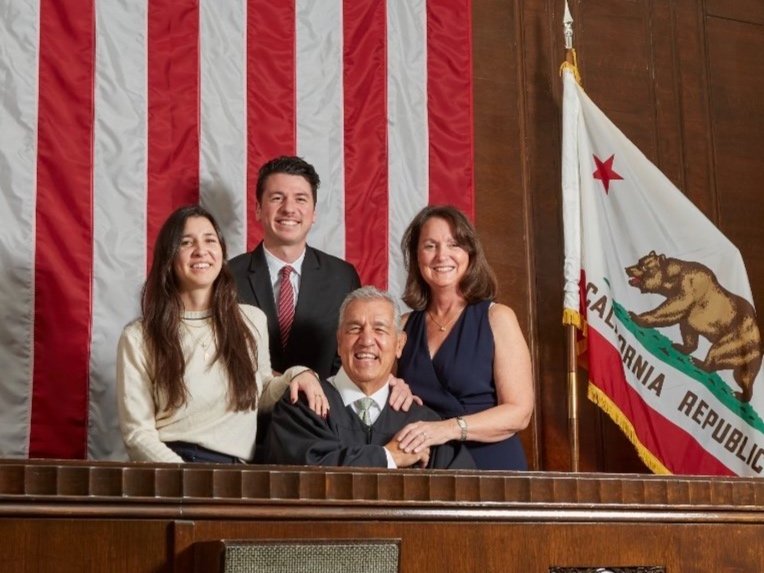Off the Bench: County Judge Dorado Reflects on Career
Alameda County Superior Court Judge and longtime Castro Valley resident Leo Dorado retired last year after 34 high-profile years on the bench—but didn’t get a retirement party due to COVID restrictions.
So, his family gathered at René C. Davidson Courthouse in Oakland a few weeks ago to throw him one.
Son Nico Dorado said his dad was happy to go to work every day and marveled at his ability to be cheerful at home after a day of serious, sometimes even gruesome, testimony in court.
“My favorite is that you’d never know if he was happy or sad about a case,” said Nico Dorado. “His ability to compartmentalize was superb.”
For his part, Leo Dorado said being a judge ended up giving him more time to spend with his family than if he had remained a trial attorney, which he had previously been.
“My family was my big reward in my career,” he said. He said his wife, Lee, had been a big part of his professional life and was proud of his son Nico and daughter Alex, who work for different parts of Google.
He said his own family had given him a good start in life despite poverty in the then-rough Jingletown neighborhood in Oakland. His father, a self-educated immigrant, worked through several blue-collar and white-collar jobs before starting the Dorado Tax Service in Fruitvale.
“When we moved to Fruitvale, it was moving uptown, and we felt we’d started to make it,” Dorado remembered.
He wishes his dad could have lived long enough to see him on the bench, though he did see Leo’s early days as an attorney.
He went through Catholic schools and then won an athletic scholarship to U.C. Berkeley, playing basketball and baseball. He went on to law school at Cal, then called Boalt Hall.
“I never could have afforded U.C. without that scholarship,” he said.
Dorado presided over hundreds of trials at the Davidson courthouse and others around the county. Earlier, he’d been a prosecutor in the San Mateo County district attorney’s office and then the Alameda County DA’s office. He was appointed to the Superior Court by former Governor George Deukemjian in 1988, one of the first Latinos appointed to a superior court in California.
He was best known, however, as the judge in the 2000 first trial of the Oakland Riders, a group of four Oakland police officers charged with numerous crimes, including planting evidence, assaulting citizens, and kidnapping. It is still cited in debates over police reform.
“It was probably my favorite case because it was complex and important,” he said. There were 10 different alleged incidents, and there was intense public interest.
Dorado prided himself on never raising his voice in a courtroom. “A trial is a serious event, especially for the defendant the rest of whose life may be in jeopardy. Everybody deserves respect,” he said.
“Actually, attorneys told me that when I lowered my voice, they knew they needed to pay close attention to what happened next,” said Dorado.
One thing he liked about being a judge was that he had great responsibility and could make a big impact, Dorado said, but even more so in juvenile court.
“They are so difficult but very rewarding,” he said of juvenile cases. Normally, he said, judges served a year in juvenile court before returning to adult cases, but he volunteered for a second year and eventually served for five.
“I was mostly trying to make them employable,” he said, “rather than being stuck with a criminal record and few job skills. If they can support themselves with a job, they’re much less likely to turn to crime.”
Dorado also worked to bring an understanding of law to students in schools at all levels and worked internationally to teach other countries about the U.S. legal system.
“People often don’t realize this, but we’re one of relatively few countries to even use a jury system. Elsewhere, a defendant usually appears just before a judge, or a panel of judges,” he said.
Dorado is perhaps proudest of his work with Puente, a mentoring program for Latinos that started at Chabot College in Hayward and has since spread nationwide. ”Puente” means “bridge” in Spanish. He’s served on the national board for 30 years.
The retired judge reported avoiding most police and legal shows on television because they get so many things wrong.
“People are always shouting, and the judge is always banging his gavel. I never even had a gavel when I was a judge. If I really needed to get people’s attention, I had a bailiff, who just happened to be an armed sheriff’s deputy,” Dorado said.
So, does the retired judge have a secret for leaving the less pleasant parts of one’s job at work each night and not taking them home?
“I just told myself everything was just evidence,” he replied. “Good or bad.”


